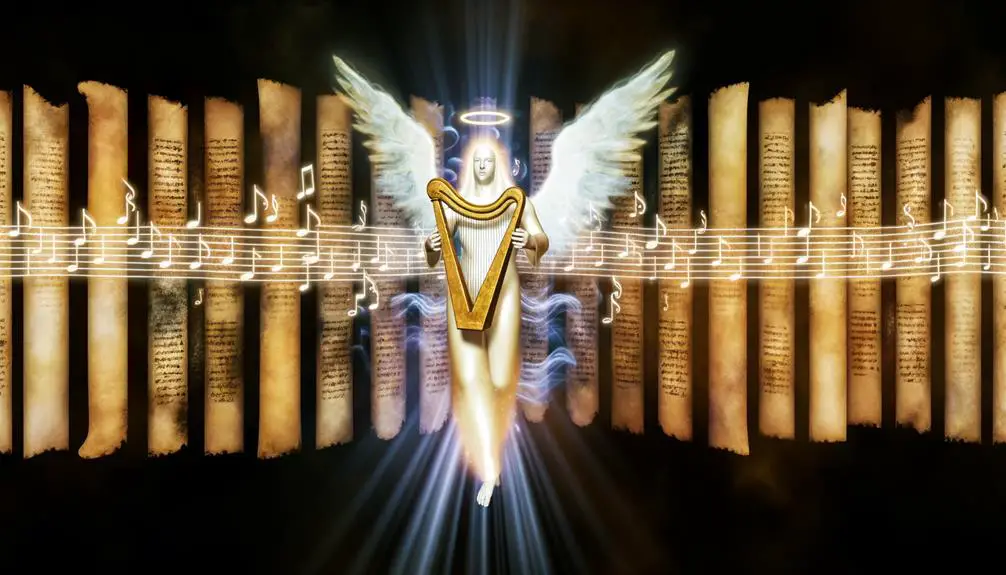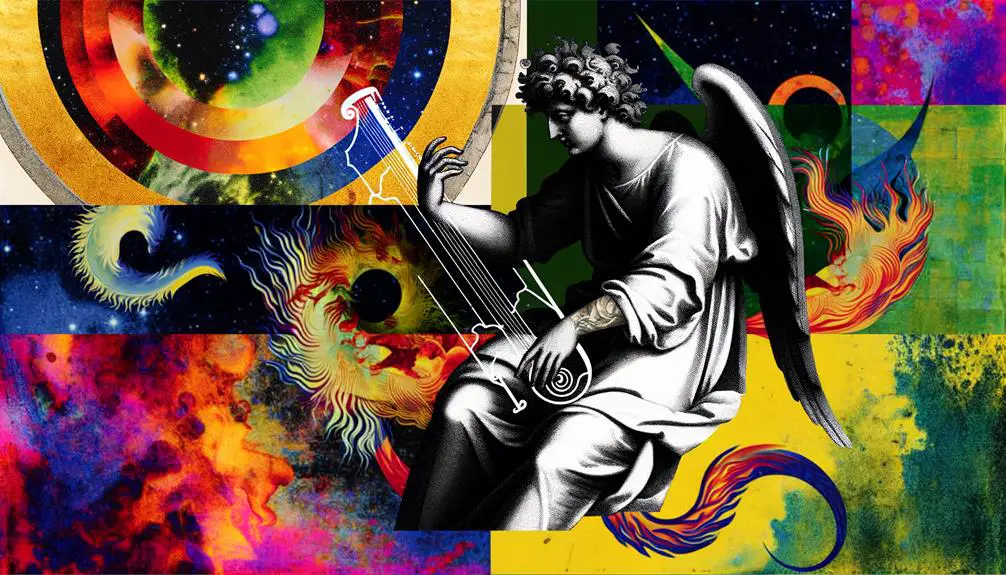Explore the enigmatic link between Lucifer, once Heaven's chief musician, and his fall, revealing the intricate dance of divinity and discord in biblical lore.

Lucifer and Music in the Bible
Isn't it fascinating how the story of Lucifer, once Heaven's most magnificent angel, intertwines with the concept of music in the Bible?
You've likely heard snippets of this narrative, suggesting that Lucifer's role involved music before his fall from grace.
This tale weaves through biblical references and symbolism, hinting at a deeper connection between spirituality and the power of music.
As we explore Lucifer's fall and the role music played in his story, along with theological interpretations and modern perspectives, you'll find yourself questioning the traditional narratives and pondering the complexities of this celestial saga.
What revelations might lie in the harmonies between the divine and the fallen?
Key Takeaways
- Lucifer's initial role involved leading celestial worship through music, symbolizing his close relationship with the divine.
- Music in the Bible acts as a conduit for spiritual connection and divine communication, reflecting its deep significance in worship.
- Lucifer's fall from grace is metaphorically mirrored in the transition from musical harmony to discord, illustrating his rebellion and downfall.
- Modern interpretations explore the complex relationship between Lucifer and music, challenging traditional narratives and highlighting music's dual nature of purity and potential for corruption.
Lucifer's Role in Heaven

Before his fall, Lucifer's role in heaven was often associated with worship and music, serving as a key figure in celestial hymnody and praise. You might find it intriguing to delve into the structure of the celestial hierarchy and the specific angelic duties that characterized the pre-fall period. Within this framework, Lucifer wasn't merely another angel; he was reputedly among the highest, with responsibilities that were deeply intertwined with the divine liturgy of the heavens.
Analyzing the celestial hierarchy, it becomes clear that angelic beings were assigned roles that reflected their proximity to the divine. They were tasked with various duties, from messengers of God to guardians of humanity and the universe. In this context, Lucifer's role was distinct. His association with music and worship wasn't arbitrary but deeply rooted in the essence of celestial worship. Music, in its purest form, was seen as a medium of communication with the divine, a form of praise that transcended words.
This analytical perspective underscores the significance of Lucifer's position. His role in the musical worship of heaven wasn't just a duty; it was a testament to his closeness to the divine, his stature within the angelic ranks, and the trust bestowed upon him. Hence, understanding Lucifer's role in heaven before his fall necessitates a comprehension of the broader celestial hierarchy and the intricate distribution of angelic duties. These responsibilities weren't merely functional but symbolic, reflecting the spiritual order and the dynamics of divine worship within the heavenly realm.
Biblical References to Music

While exploring the role of music in divine worship, it's crucial to analyze its portrayal and significance within biblical texts, where musical expressions are frequently depicted as a powerful means of connecting with the divine. The scriptures are replete with instances where music serves not just as an accompaniment to religious observance but as a vital component of spiritual life and communication with God.
In the context of Temple rituals, music held a central place. The Old Testament describes in detail the organization of musicians and singers dedicated to the service of the Temple, underscoring the importance of music in worship and sacrificial ceremonies. These practices suggest that music wasn't merely an aesthetic addition but a conduit for spiritual experience and expression, facilitating a closer connection between the divine and the earthly realms.
Moreover, the melodies of the prophets, often referred to as Prophet melodies, serve as another critical aspect of biblical music. These weren't only expressions of personal devotion but also served prophetic purposes, conveying divine messages and visions through the power of music. This dimension of biblical music underscores its role not just in worship but in the communication of divine will and guidance to the people.
Analyzing these references, it's clear that music in the Bible isn't simply a backdrop to spiritual life but an integral part of it. Through Temple rituals and Prophet melodies, music emerges as a multifaceted tool for worship, prophecy, and the fostering of a deeper connection with the divine. This scholarly exploration reveals the profound significance of music in biblical texts, highlighting its role as a bridge between the human and the divine.
The Fall of Lucifer
The narrative of Lucifer's fall from grace, often interpreted through theological and literary lenses, marks a pivotal moment in Judeo-Christian cosmology. It sheds light on the complex dynamics of rebellion, pride, and the consequences of divine disobedience.
Central to this story is Lucifer's pride, which serves as the catalyst for the angelic rebellion. It illustrates a profound moral lesson on the dangers of hubris and the severe repercussions of challenging divine authority.
Lucifer, once hailed as the morning star and celebrated for his beauty and wisdom, allowed pride to corrupt his essence. This pride led him to aspire to ascend above his Creator, seeking to usurp God's throne and claim ultimate power and glory for himself. This act of insubordination ignited an angelic rebellion, pitting Lucifer and his followers against the divine order.
The rebellion, however, was doomed from the start, as the notion of creation overpowering the Creator defies the very principles of Judeo-Christian theology. The fallout from Lucifer's pride and subsequent rebellion is monumental. Cast out of heaven and stripped of his former glory, Lucifer's transformation into Satan, the adversary, embodies the tragic fall from divine favor.
This narrative serves not only as a cautionary tale about the perils of pride and disobedience but also highlights the immutable nature of divine justice and the inevitability of consequences for those who defy the divine will.
Thus, Lucifer's fall underscores a fundamental theme in Judeo-Christian thought: the inherent danger of allowing pride to cloud judgment and the irrevocable consequences of rebelling against divine authority.
Symbolism of Music in His Story

You'll find that Lucifer's musical role, while not explicitly detailed, carries profound symbolic weight within biblical narratives. The interpretations of music in the Bible offer insights into its perceived power to shape spiritual experiences and influence.
Through tunes, one can trace a line of spiritual impact that underscores the complex relationship between divine messages and human reception.
Lucifer's Musical Role
Considering the rich tapestry of biblical narratives, it's essential to understand how music symbolically portrays Lucifer's complex role within these stories.
Aspect |
Significance |
|---|---|
Instrument Design |
Symbolizes Lucifer's creativity and perfection |
Angelic Choirs |
Represents his initial harmony with the divine |
Music as Power |
Illustrates his influence and allure |
Fall from Grace |
Transition from harmony to discord |
Lucifer's musical role, deeply intertwined with instrument design and angelic choirs, underscores his elevated status among celestial beings. Initially, music manifests as a divine expression of perfect harmony, reflecting his close association with the divine. However, as the narrative unfolds, music becomes a metaphor for his ambition, seduction, and eventual discord, illustrating his complex journey from revered leader to fallen angel.
Biblical Music Interpretations
In biblical narratives, music symbolically weaves through Lucifer's story, offering deep insights into his character and the cosmic struggle between good and evil. This symbolism extends beyond mere melody, encompassing the very instruments and choirs that define the celestial and terrestrial realms.
Musical instruments, often cited in scriptures, aren't just tools for worship or entertainment; they're emblematic of spiritual authority and power dynamics. The origins of choirs, too, trace back to these narratives, suggesting a divine blueprint for communal worship and the angelic hierarchy.
Analyzing these elements, you'll find that music in the Bible isn't just background noise but a profound commentary on rebellion, redemption, and the eternal battle for souls, devoid of any direct spiritual influence through tunes.
Spiritual Influence Through Tunes
Exploring the narrative further, it becomes clear that music's role extends beyond mere symbolic representation to exert a profound spiritual influence on listeners, shaping perceptions and guiding actions within biblical stories. This influence manifests through:
- Musical Therapy: The therapeutic use of music to heal and comfort, reflecting its divine purpose.
- Instrumental Evolution: The development of musical instruments, symbolizing the progression of divine communication.
- Emotional Resonance: The ability of music to evoke deep emotional responses, facilitating spiritual connections.
- Moral Guidance: Music's role in imparting moral lessons and ethical guidelines, shaping the spiritual journey of believers.
These elements underscore music's multifaceted spiritual significance, illustrating its power to touch the soul and influence the path of righteousness within the biblical narrative.
Theological Interpretations

Theological interpretations of Lucifer's association with music in the Bible vary, reflecting a spectrum of beliefs about his role and influence. Within this framework, you'll find that the concept of an angelic hierarchy plays a significant role in understanding Lucifer's initial position and subsequent fall from grace. Traditionally, Lucifer is thought to have been a high-ranking angel, possibly even the chief musician in heaven, tasked with the creation and oversight of divine melodies. This role, deeply entwined with the celestial worship of God, underscores the importance of music as a divine medium of expression and communication.
Scholars and theologians have debated the extent to which Lucifer's musical abilities contributed to his pride and eventual rebellion against God. Some interpretations suggest that his gift for music and his position within the angelic hierarchy endowed him with a sense of superiority, leading to his downfall. Others propose a more nuanced view, considering his musical role as symbolic of his overarching purpose to reflect God's glory, which was perverted by his desire for self-aggrandizement.
The theological discourse extends to the implications of Lucifer's fall on the nature of music itself. Questions arise about whether music, once a pure expression of divine worship, was tainted by its association with Lucifer's rebellion. Here, opinions diverge, with some arguing that music retains its inherent goodness, capable of glorifying God, while others caution against the potential for music to seduce and corrupt, reflecting its complex history with the fallen angel.
In analyzing these perspectives, it's clear that the intersection of music, angelology, and theology offers a rich tapestry of interpretations, each contributing to a deeper understanding of Lucifer's enigmatic character and the profound significance of music within the biblical narrative.
Modern Perspectives on Lucifer and Music

Today's discussions delve into how contemporary cultural and scholarly reinterpretations of music and Lucifer blend historical theology with modern insights. This exploration expands on the narrative, examining how modern perspectives on Lucifer and music offer a comprehensive understanding of the relationship between the two. Music, an art form, has been a tool for storytelling, and the narrative of Lucifer has been a compelling subject for many modern artists. The contemporary discourse focuses on the cultural impact and artistic portrayals of Lucifer in music, shedding light on how these interpretations reflect and influence societal views.
- Cultural Impact: Modern perspectives highlight how music influences and reflects society's evolving views on Lucifer. This impact ranges from fear and caution to fascination and admiration, demonstrating a shift towards a more nuanced understanding of the figure.
- Artistic Portrayals: Artists use music to explore the complex nature of Lucifer, often blurring the lines between villainy and heroism. These portrayals contribute to a more profound cultural discourse on morality, redemption, and the nature of evil.
- Scholarly Analysis: Researchers dissect the layers of meaning within music, examining how Lucifer's representation challenges traditional theological concepts and inspires a reevaluation of moral absolutes.
- Modern Mythology: Music contributes to the reimagining of Lucifer as a symbol within modern mythology, embodying rebellion, freedom, or enlightenment, depending on the narrative context.
These perspectives offer a multifaceted view of Lucifer in music, demonstrating that the relationship between them is as complex as it's intriguing.
Frequently Asked Questions
How Has the Portrayal of Lucifer's Association With Music Influenced Contemporary Music Genres, Such as Rock and Metal?
You've seen how musical symbolism and genre evolution intertwine, shaping rock and metal's thematic core. By delving into these genres, you'll notice they often play with themes of rebellion and freedom, echoing a certain infamous figure's narrative.
This dynamic hasn't only enriched their musical tapestry but also challenged societal norms. Your analysis reveals how these contemporary music styles have been profoundly influenced, crafting an enduring legacy of complexity and depth.
Are There Any Historical Figures or Musicians Who Have Claimed to Be Inspired by Lucifer in Their Musical Creations?
You're diving into a playlist where history's tracks meet Lucifer's Symphony, a tune humming through the ages.
Indeed, several historical figures and musicians have openly claimed inspiration from such Satanic Melodies in their works. Analyzing this, you'll notice a blend of controversy and creativity, as their admissions add layers to the understanding of cultural and musical evolution.
This insight not only enriches the historical perspective but also underscores the complex relationship between artistry and influence.
How Do Different Religious Traditions Outside of Christianity Interpret the Connection Between Lucifer and Music?
You're delving into how various religious traditions perceive the link between music and a figure akin to Lucifer, minus his biblical backstory. These traditions often interpret musical symbolism and the origins of such a character distinctively, not always aligning with Christian narratives.
They might view music as a neutral or even divine tool, rather than associating it with moral downfall. Analyzing these interpretations offers a broader understanding of music's complex symbolism across cultures.
What Psychological Impacts Might the Association of Lucifer With Music Have on Listeners, Especially in the Context of Religious Beliefs?
Linking music with negative figures can cast a long shadow over your perception, potentially leading to societal stigma. This association might deeply affect your emotional resonance with certain music, especially if it clashes with your religious beliefs.
You could experience a range of psychological impacts, from guilt to fear, altering the way you interact with or enjoy music. Analyzing this connection helps understand the complex interplay between culture, belief, and personal experience.
Can the Concept of Lucifer's Connection With Music Be Found in Any Non-Abrahamic Religious Texts or Folklore?
You're exploring if mythological parallels to Lucifer's connection with music exist in non-Abrahamic texts or folklore.
This inquiry delves into how cultural perceptions shape narratives around entities akin to Lucifer and their relationship with music.
Analyzing these stories can reveal common themes or unique interpretations across different cultures.
Such analysis is crucial for understanding the broader implications of linking supernatural beings with music, beyond a singular religious perspective.
Conclusion
In the grand cosmic opera, Lucifer's tale is an overture that resonates with the celestial and the fallen. You've seen how his melodies, once harmonious with the divine, became dissonant anthems of rebellion.
Through this exploration, it's clear that his story, steeped in symbolism and theological musings, hits a chord deep within the human soul. Music, in this narrative, isn't just sound; it's the battleground of light and darkness, echoing infinitely in the corridors of history and belief.



Sign up